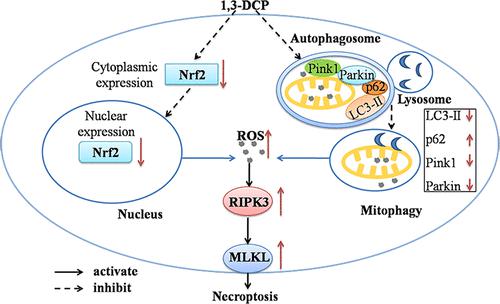当前位置:
X-MOL 学术
›
J. Agric. Food Chem.
›
论文详情
Our official English website, www.x-mol.net, welcomes your
feedback! (Note: you will need to create a separate account there.)
1,3-Dichloro-2-propanol-Induced Renal Tubular Cell Necroptosis through the ROS/RIPK3/MLKL Pathway
Journal of Agricultural and Food Chemistry ( IF 5.7 ) Pub Date : 2022-08-24 , DOI: 10.1021/acs.jafc.2c02619 Yong Fan 1 , Jing Lu 1, 2 , Zelin Yu 1 , Xiao Qu 1 , Shuang Guan 1, 2
Journal of Agricultural and Food Chemistry ( IF 5.7 ) Pub Date : 2022-08-24 , DOI: 10.1021/acs.jafc.2c02619 Yong Fan 1 , Jing Lu 1, 2 , Zelin Yu 1 , Xiao Qu 1 , Shuang Guan 1, 2
Affiliation

|
1,3-Dichloro-2-propanol (1,3-DCP), as a food pollutant, exists in a variety of foods. Studies have shown that it has nephrotoxicity. In the study, we found that 1,3-DCP caused renal injury with necroptosis in C57BL/6J mice. The mechanism of 1,3-DCP-caused nephrotoxicity was further explored in NRK-52E cells in vitro. We found that 1,3-DCP caused cell necroptosis with the increase in lactate dehydrogenase (LDH) levels and the expressions of RIPK3 and MLKL. But pretreatment with a ROS inhibitor N-acetyl-l-cysteine (NAC), a RIPK3 inhibitor GSK’872, or RIPK3 gene silencing alleviated 1,3-DCP-induced cell necroptosis. The data indicated that 1,3-DCP induced necroptosis through the ROS/RIPK3/MLKL pathway in NRK-52E cells. In further mechanistic studies, we explored how 1,3-DCP induced ROS production. We found that 1,3-DCP inhibited the expressions of nuclear and cytoplasmic Nrf2. But pretreatment with an Nrf2 activator dimethyl fumarate (DMF) up-regulated the expressions of nuclear and cytoplasmic Nrf2 and down-regulated ROS levels and RIPK3 and MLKL expressions. We also examined the effects of mitophagy on 1,3-DCP-induced ROS. The data manifested that 1,3-DCP suppressed mitophagy in NRK-52E cells by decreasing LC3-II, Pink1, and Parkin levels, increasing p62 levels, and decreasing colocalization of LC3 and Mito-Tracker Red. Pretreatment with an autophagy activator rapamycin (Rapa) decreased 1,3-DCP-induced ROS. Taken together, our data identified that 1,3-DCP caused renal necroptosis through the ROS/RIPK3/MLKL pathway.
中文翻译:

1,3-二氯-2-丙醇通过 ROS/RIPK3/MLKL 通路诱导肾小管细胞坏死
1,3-二氯-2-丙醇(1,3-DCP)作为一种食品污染物存在于多种食品中。研究表明,它具有肾毒性。在该研究中,我们发现 1,3-DCP 在 C57BL/6J 小鼠中引起肾损伤并伴有坏死性凋亡。在体外研究了 NRK-52E 细胞中 1,3-DCP 引起肾毒性的机制。我们发现随着乳酸脱氢酶 (LDH) 水平和 RIPK3 和 MLKL 表达的增加,1,3-DCP 引起细胞坏死性凋亡。但是用 ROS 抑制剂N-乙酰-l预处理-半胱氨酸 (NAC)、RIPK3 抑制剂 GSK'872 或 RIPK3 基因沉默可减轻 1,3-DCP 诱导的细胞坏死。数据表明,1,3-DCP 在 NRK-52E 细胞中通过 ROS/RIPK3/MLKL 通路诱导坏死性凋亡。在进一步的机理研究中,我们探索了 1,3-DCP 如何诱导 ROS 产生。我们发现1,3-DCP抑制核和细胞质Nrf2的表达。但是用 Nrf2 激活剂富马酸二甲酯 (DMF) 预处理上调了核和细胞质 Nrf2 的表达,并下调了 ROS 水平和 RIPK3 和 MLKL 的表达。我们还检查了线粒体自噬对 1,3-DCP 诱导的 ROS 的影响。数据表明,1,3-DCP 通过降低 LC3-II、Pink1 和 Parkin 水平、增加 p62 水平以及降低 LC3 和 Mito-Tracker Red 的共定位来抑制 NRK-52E 细胞中的线粒体自噬。用自噬激活剂雷帕霉素 (Rapa) 预处理可降低 1,3-DCP 诱导的 ROS。总之,我们的数据确定 1,3-DCP 通过 ROS/RIPK3/MLKL 通路引起肾坏死性凋亡。
更新日期:2022-08-24
中文翻译:

1,3-二氯-2-丙醇通过 ROS/RIPK3/MLKL 通路诱导肾小管细胞坏死
1,3-二氯-2-丙醇(1,3-DCP)作为一种食品污染物存在于多种食品中。研究表明,它具有肾毒性。在该研究中,我们发现 1,3-DCP 在 C57BL/6J 小鼠中引起肾损伤并伴有坏死性凋亡。在体外研究了 NRK-52E 细胞中 1,3-DCP 引起肾毒性的机制。我们发现随着乳酸脱氢酶 (LDH) 水平和 RIPK3 和 MLKL 表达的增加,1,3-DCP 引起细胞坏死性凋亡。但是用 ROS 抑制剂N-乙酰-l预处理-半胱氨酸 (NAC)、RIPK3 抑制剂 GSK'872 或 RIPK3 基因沉默可减轻 1,3-DCP 诱导的细胞坏死。数据表明,1,3-DCP 在 NRK-52E 细胞中通过 ROS/RIPK3/MLKL 通路诱导坏死性凋亡。在进一步的机理研究中,我们探索了 1,3-DCP 如何诱导 ROS 产生。我们发现1,3-DCP抑制核和细胞质Nrf2的表达。但是用 Nrf2 激活剂富马酸二甲酯 (DMF) 预处理上调了核和细胞质 Nrf2 的表达,并下调了 ROS 水平和 RIPK3 和 MLKL 的表达。我们还检查了线粒体自噬对 1,3-DCP 诱导的 ROS 的影响。数据表明,1,3-DCP 通过降低 LC3-II、Pink1 和 Parkin 水平、增加 p62 水平以及降低 LC3 和 Mito-Tracker Red 的共定位来抑制 NRK-52E 细胞中的线粒体自噬。用自噬激活剂雷帕霉素 (Rapa) 预处理可降低 1,3-DCP 诱导的 ROS。总之,我们的数据确定 1,3-DCP 通过 ROS/RIPK3/MLKL 通路引起肾坏死性凋亡。




















































 京公网安备 11010802027423号
京公网安备 11010802027423号